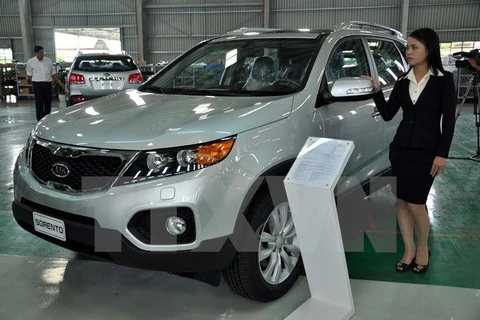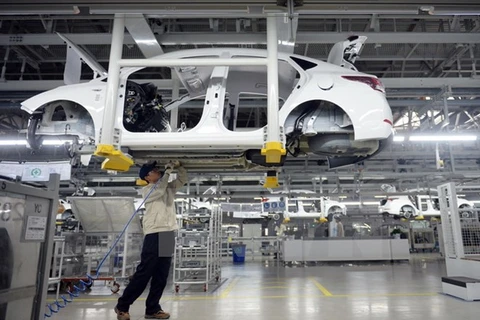Hanoi (VNA) – Management agencies and businesses should consider customers the centre of the domestic auto industry to spur the sector’s growth in the context of international integration, experts have suggested.
2019 to see new record in car sales
The Vietnam Automobile Manufactures’ Association (VAMA) unveiled on October 10 that its members sold 27,767 units of vehicles in September, up 29 percent against the previous month.
Of the figure, 20,916 were passenger vehicles, up 37 percent; 6,532 commercial cars, up 10 percent; and 319 special-purpose vehicles, up 10 percent month-on-month.
During the January-September period, total sales stood at 230,334 units, a rise of 18 percent over the corresponding time last year.
Sales of domestic-assembled vehicles expanded 35 percent to 16,994 in September, while that of imported vehicles rose 21 percent to 10,773.
In the first nine months of this year, a total of 230,334 vehicles were sold, a year-on-year increase of 18 percent, including 168,694 passenger vehicles (up 30percent), 57,523 commercial cars (down 3 percent) and 4,117 special-purpose vehicles (down 27 percent).
However, experts said, such numbers have yet to fully reflect the development of the local auto market as apart from VAMA members, there are other brands like TC Motor, Audi, Jaguar, Land Rover, Subaru, Volkswagen, Volvo and VinFast that have not announced their car sales.
The domestic auto industry, therefore, is forecast to set a new record in sales this year to hit 384,000 units, surpassing nearly 290,000 vehicles recorded sold in 2018 and the record of 304,000 in 2016.
Auto market turns to costumers
Nguyen Dang Duy Nhat, General Director of Global Elite Consulting and Director of CMO Council in Vietnam, said at a workshop on October 24 that the strategy that takes costumers as the centre should focus on values of each brand.
Free trade agreements with a tax reduction roadmap to 0 percent have forced producers to pay more attention to costumers in order to improve their competiveness and expand the market, he said, stressing that this is a tough issue facing each firm.
In the global auto market, many enterprises have gained successes following product improvement and efficient risk management. Meanwhile, some others select costumers through grasping market trends.
Nhat pointed out that digitalisation has resulted in the rapid changes of behavior and habit of costumers.
The digital world requires enterprises to apply digital technologies in production, he said, suggesting firms focus on such sectors as speed, price and quality, along with innovation to gain successes.
Ninh Huu Chan, General Secretary of the VAMA, said the Vietnamese auto market holds potential with advantages in population and the limited number of private cars.
Businesses conquer costumers through investment, technological development and the introduction of special products. Meanwhile, management agencies can roll out suitable policies by studying market changes and costumers’ liking.
Do Nam Binh, Director of the Centre for Social Enterprise Development, said the auto sector has been regarded as one of the leading industries that have driven others like mechanics, electronics and chemicals.
The sector’s potential depends on the three factors of population scale and structure, per capita income and the average number of cars per 1,000 people, he said.
In Vietnam, the industry is expected to grow more when per capita GDP exceeds 3,000 USD, and the average number of cars per 1,000 people hits 50, according to Binh.
He added that Vietnam’s demand for cars is forecast to bloom by 2025, explaining that the country has a golden population structure with a rapid increase of the middle class.
However, the fierce competition with imported vehicles, especially those from other member countries of the Association of Southeast Asian Nations (ASEAN) such as Thailand and Indonesia as well as members of free trade agreements which Vietnam has joined will boost Vietnam’s auto import revenue.
Vietnam’s trade deficit in the auto sector is projected to exceed 3.4 billion USD this year.
Given this, experts suggested competent agencies complete domestic tax policies in an effort to help local firms improve their competitiveness./.
























